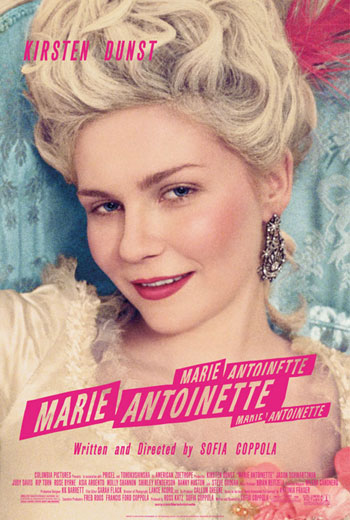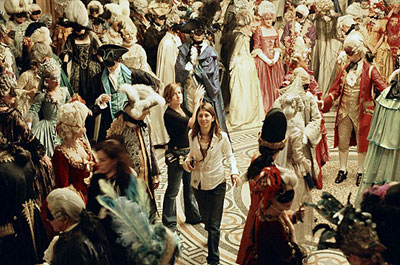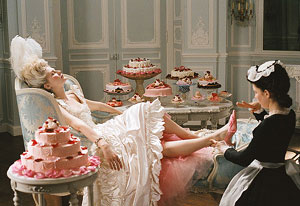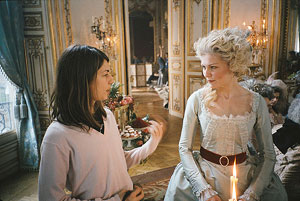 Sofia Coppola could be a character in one of her own movies. She’s very quiet, and every answer here was given in a halting, sometimes mumbling manner. I don’t know if she was tired or uncomfortable, but the style of her films – big, empty spaces where dialogue would be – makes a lot more sense after talking to her. She couldn’t be any more different than her famously gregarious father, either as a person or a filmmaker.
Sofia Coppola could be a character in one of her own movies. She’s very quiet, and every answer here was given in a halting, sometimes mumbling manner. I don’t know if she was tired or uncomfortable, but the style of her films – big, empty spaces where dialogue would be – makes a lot more sense after talking to her. She couldn’t be any more different than her famously gregarious father, either as a person or a filmmaker.
This interview was conducted as a roundtable at the big Sony headquarters in midtown Manhattan the day before Marie Antoinette played at the New York Film Festival. The movie had premiered months before in Cannes, where it was met with the usual mixed festival signals – booing at one screening, a standing ovation at another. In the months since the film has been dividing critics sharply, with some despising the movie and some loving it. Many who hate the film (and even some who like it) dismiss Marie Antoinette as shallow, a charge that I think means they’re missing Coppola’s whole point, as well as letting her style confuse them.
After the interview I rode the elevator down with Coppola who, by the way, is very, very pregnant. She seemed a little less guarded, and we talked about Rip Torn, who has a terrific presence in the film. It was one of those little cool moments that end up meaning a lot because frankly, I think Sofia Coppola is one of the most talented directors working today, and without a doubt the most misunderstood.
Q: When did you come up with the idea to tell this story about Marie Antoinette in this way?
Coppola: When I was reading the biography of Marie Antoinette by Antonia Fraser I just kept thinking about how to tell the story in my own way, in a way that I would want to see it. That’s when I thought about the challenge of how to approach it.
Q: Is this intended to be geared towards people under 30?
Coppola: I just made it the way I wanted to see it.
Q: This film is dividing critics. There are some who love it and some who seem to just not get it, and they keep calling it shallow. How do you rebut that?
Coppola: It’s about superficiality. Shallowness is an element of the story. I don’t think it is [shallow]. I think anything you do that’s different, that doesn’t take the typical approach, invites differing opinions.
Q: Are you happy it’s provoking the reaction it is? It seems like the people who like it love it and the people who don’t like it really hate it.
Coppola: I think being mediocre and in the middle would be the worst. It’s more interesting to get strong reactions, and to have the mixture of people who get it and the people who don’t get it. And to invite a dialogue.
Q: The reaction at Cannes was mixed, and there was booing. What’s your take on that? Coppola: I think it got really exaggerated but when I was there it was all exciting. There was a mixture… definitely some of the French journalists loved it, but for others it was a loaded topic and they were outraged that some American would come in and tell that story. I was excited to be on the cover of Cahiers du Cinema – that was such a historical moment for me.
Coppola: I think it got really exaggerated but when I was there it was all exciting. There was a mixture… definitely some of the French journalists loved it, but for others it was a loaded topic and they were outraged that some American would come in and tell that story. I was excited to be on the cover of Cahiers du Cinema – that was such a historical moment for me.
Q: What exactly happened, though? There are so many conflicting reports.
Coppola: I wasn’t there when it happened, but I heard that five people booed and the rest of the audience applauded. It was journalists. At the public screening we had a long standing ovation.
Q: Some people might have expected there to be cut aways to the starving peasants in France, to keep that in the audience’s mind. Did you deliberately not go there?
Coppola: The idea was to tell the story from her point of view. In this bubble they were in they were so unaware of what was going on outside that I wanted to stay in her point of view and intentionally not show the world outside.
Q: A lot of people have noticed that in the big shoe montage a pair of Converse sneakers show up.
Coppola: It was just in a shot, and we left it in to be fun. Some people go with it and some people don’t.
Q: Some people have drawn comparisons to Paris Hilton and the modern bling culture. Is that fair, or is it too limiting?
Coppola: I wasn’t thinking of that. There is an element of it there; the jet set and the in-crowd of that time, but I wasn’t thinking of it. I can see how people can make that connection.
Q: When did the idea of using modern music on the soundtrack come to you?
Coppola: When I was working on the script. I always liked the New Romantic period, and that was my introduction as a kid to the 18th century. I thought it might be fun to have an element of that, and to have that playful spirit because of these young characters and the energy of that moment in time, which was such a volatile transition. I wanted to mix the 18th century music and that music, and to create a separate world between the adults of the court and the kids.
Q: The Vanity Fair piece on Antonia Fraser makes it clear that you won her over, but was there ever a point where you guys had a disagreement in how to make her book into a film?
Coppola: I think she was always aware that a movie is much different from a book, so she was never protective. She said, ‘I don’t own Marie Antoinette, and she’s open to anyone’s interpretation.’ She was very helpful and willing to offer her opinion and advice. Sometimes she would disagree with my approach, but she was always encouraging me to do it my way.
Q: You seem to have had unprecedented access to Versailles.
Coppola: It was amazing that they gave us such access. I just met with the directors and explained my approach and they were really open to me and my crew. They let us in to all these areas.
Q: Had they had a crew in there before?
Coppola: They’ve allowed some filming in there but not to that scale. We got to go into her private theater, which had been closed. They never let people into there before. It was exciting to go into a lot of those places.
Q: Was this a good experience for them? Do you think they would do it again?
Coppola: They always seemed positive, and they liked the end result. It seemed like a positive experience for everyone.
Q: When you’re only the third woman to be nominated for the Best Director Oscar, does that place a lot of pressure on you for your next picture?
Coppola: No, I don’t think about that. You just set personal challenges for yourself that you want to do something you haven’t done before, or that you want to learn something, but I don’t think about that.
Q: Why do you think it is that you’re just the third woman to be nominated?
Coppola: I don’t know. I feel like it’s not my job to understand that.
Q: Your films have such sparse dialogue.
Coppola: I like telling the story in a visual way. I don’t like explaining a lot in dialogue.
Q: Why do you go that route? A lot of younger directors seem to come from a very TV-oriented background, where it’s like exposition with images. You’re coming from a much more purely cinematic place.
TV-oriented background, where it’s like exposition with images. You’re coming from a much more purely cinematic place.
Coppola: I guess I didn’t watch a lot of TV growing up.
Q: Are you particularly aware of being especially cinematic?
Coppola: No, I think when you’re making a film you’re thinking about how to tell the story visually. I guess I’m probably influenced by the movies I saw. I didn’t think of the TV thing until you said that, so maybe that’s the difference.
Q: Jason Schwartzman mentioned working with you on his character by writing dialogue for him that he wanted to say but didn’t, the stuff that was running through his head. Is your approach to filmmaking like that with all the actors, being that collaborative?
Coppola: I try to always be open to what the actors want to try. I don’t storyboard and try to be intuitive and open on the day of filming. I probably worked closer with him because his character wasn’t able to say what he wanted to say.
Q: Is your style influenced by your father?
Coppola: I think we have very different styles, but my interest in filmmaking comes from him. He’s always encouraged me to make things as personal as I can, to follow my heart and intuition. I get that from him, but I think I have a much more – obviously! – female point of view and approach.
Q: The big dramatic moments that an actor would want to play happen at the end of Marie Antoinette’s life – the trial, losing her children, the execution. You stop the film before any of that. Why?
Coppola: What happens to her after Versailles is a really long story, with an escape and she’s in prison for many years, and there’s a trial. We weren’t making a mini-series – we just didn’t have the time and I didn’t want to abbreviate all that. I decided to focus on her years in Versailles, starting with her arrival as a young girl and following her evolution ending with her on the balcony [in front of the angry mob], where she becomes a woman.
And it’s almost like a different style of filmmaking – it almost becomes an action movie. The escape and all that stuff.
Q: Would you ever return for that second part of the story?
Coppola: I can’t. It was interesting to read about, but I can’t imagine making that kind of movie. I wanted to tell more of an impressionistic portrait of her growing up.
Q: Other than the book, what research did you do?
Coppola: We looked at a lot of books on that period, and we looked at the real letters between her and her mother. For visual research we looked at the portraiture of that time. And then we talked to a lot of experts in that area; we had advisors for the etiquette and a choreographer for the movement. People that specialize in the feel of that time. And the guardians of Versailles were around and helpful to us.
Q: You come from this big clan that’s very family oriented. How important is it for you to keep your family involved in your professional life?
Coppola: We grew up doing things together, so this seems like an extension of that. Making films is like making stuff together as kids. It’s nice to have that environment. I’m really glad my brother can come and shoot the second unit, and my mom made the behind the scenes [documentary]. I grew up watching my dad work like that, so it seemed like the way I wanted to do things.
Q: Why did you cast Kirsten? Coppola: I liked working with her on The Virgin Suicides, and when I was reading about Marie Antoinette I thought that she was a character Kirsten could portray. And she’s from a German background, so I thought she had the look. And she could make the transformation from a very young girl into a woman. I think she had both sides that I wanted the character to have; she has a playful, light side and she also has a substantial depth to her.
Coppola: I liked working with her on The Virgin Suicides, and when I was reading about Marie Antoinette I thought that she was a character Kirsten could portray. And she’s from a German background, so I thought she had the look. And she could make the transformation from a very young girl into a woman. I think she had both sides that I wanted the character to have; she has a playful, light side and she also has a substantial depth to her.
Q: Versailles seemed to be built to dwarf nature. In the film you go from the baroque aspects of Versailles to some beautiful scenes set in nature. Why did you go there?
Coppola: I think she went through a period in her life where she tried to escape court life and she did gardening. I think it was an attempt to be in touch with something more real than that world. I wanted to show that. That’s sort of our Terence Malick homage.
Q: Was Versailles distracting, visually? How much did you feel compelled to shoot it as opposed to what was going on inside of it?
Coppola: It was definitely a big character in the story but I always tried to stay focused on the emotional story of the main characters. I tried not to get lost in all the splendor of what was around us. I mean, I wanted to show that but not to lose focus on the story.
Q: Were there any scenes that were a technical nightmare to shoot? I’m thinking that scene by the pools where the sun rises.
Coppola: That was just about rushing to get the light. What was complicated for me were the big crowd scenes, the horses and the extras, placing everybody. And some of the ritualistic scenes, coordinating all that. It was new for me.
Q: That scene by the pools when the sun rises is one of my favorite scenes, but it also feels like one of the most contemporary moments. I think anyone who has ever been to a crazy party knows that moment. Is that something that might have really happened – and if not, how important is it to be true to the time as opposed to being true to the emotions?
Coppola: I think there were really stories about them running out to see the sunrise, and then in the pamphlets they said she was having an orgy; they would misinterpret it. But there are things like she didn’t really drink champagne. That was something I think you take artistic license with, and I wanted to show partying and decadence in a quick way, and to me champagne represents that. Technically she didn’t really drink champagne. But I tried to show the impression, the feeling of what it was like, and that was the main goal. But all based on how they lived.
Q: Do you think she’s a sympathetic character?
Coppola: I think so. I liked from Antonia Fraser’s book that she was human, and she was flawed. But I think she was sympathetic.
Q: To what extent was she spoiled?
Coppola: I mean, she was the Queen of France! [laughs]
Q: Some people have said she wasn’t a political figure, that she was brought to Versailles to be a baby machine. Do you agree with that, or do you think she had political power?
Coppola: I don’t think she was raised with the kind of education that would prepare her for running a country, but I think later in life she became more politically active and tried to be a political figure. But it doesn’t seem like in her upbringing she was educated in a way to do much more than her main job, which was to dress up and be at these rituals.
Q: The soundtrack obviously puts the audience in an 80s frame of mind, but so do the colors. Were you looking to the 80s in general when designing the movie?
Coppola: I grew up in the 80s, so when I’m thinking of teenagers I’m probably thinking of when I was a teenager. But the colors came from when I saw her real private apartments. I was real surprised when I saw that she had picked turquoise and bright pinks – they’re not the colors I think of when I think of that period. I wanted to create the world from her point of view, from what she liked and what she had. And I wanted it to be more vibrant – things you see in a museum are faded over the years. I wanted it to feel like they were alive then, and had vitality. But it was based on her palette.
Q: Is there another project, or are you taking a long time off for the baby?
Coppola: I’m glad to be done with this and to focus on having a baby. At some point I want to get back to writing.
Q: You don’t have something cooking in the back of your head?
Coppola: There are always little inklings of ideas, but they’re not formed yet. I definitely think I would like to do something more intimate after such a large scale production.
Q: Is there the thought that having a child will change the way you approach work?
Coppola: I haven’t really thought about that, but it’s not like all of a sudden I’ll want to make kid’s movies. But I’m sure your point of view changes.
Q: How long was your first cut of this movie?
Coppola: I don’t remember. About three hours or so.
Q: Is that going to be on the DVD?
Coppola: I’m working on the DVD. I think there will be a few deleted scenes, but there isn’t much.
Q: How do you approach doing DVDs? Your dad has really pioneered the massive special editions, like the new Apocalypse Now, which has everything you could ever want to know about the movie on it. Do you subscribe to that?
Coppola: I don’t do too much, but I like to have a little something extra. My mom’s documentary will be on the DVD. I’m torn about deleted scenes, because you cut them out for a reason, so do you really want people to see them? But you want to put a little bit on there just to have something additional. But I definitely don’t have all the libraries of material that a movie like Apocalypse Now would have.
Q: Are you going to do a commentary?
Coppola: I’ve never done that.
Q: You don’t like them?
Coppola: It’s just something that I never watched. I just don’t feel like… maybe when I’m old and feel like a master I’ll want to share that, but now I just feel self-conscious talking about it!